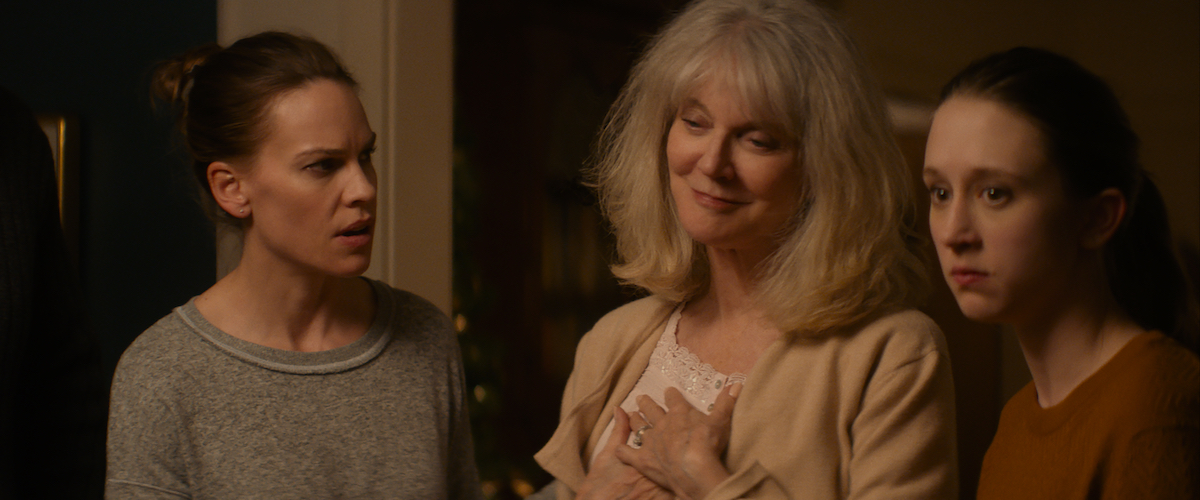There’s an inherent longing in Elizabeth Chomko’s stunning feature debut, “What They Had.” The story will reveal that the phrase refers to the kind of undying love of a man for his wife, even as her memory of their life together cruelly slips away from her because of disease. What they had is not what any of their children have had, both of whom are struggling with connection and happiness in various ways. But what they had is also a reference to the old couple’s time together—the priceless moments they shared between dates, marriage and children—now coming to an end with memory loss. It was once a deep and vibrant love that has moved into the past tense.
Bridget (Hilary Swank) is on edge. On the surface, she looks to have her life in order—a career as a chef, a daughter in college, a husband waiting for her at home—but her nights are restless. When her gruff brother, Nick (Michael Shannon), calls her to tell her that their mother has wandered off in the middle of the night, it throws her life into chaos. With her daughter, Emma (Taissa Farmiga), Bridget rushes from California to her hometown of Chicago to help her brother petition their stubborn father, Bert (Robert Forster), to seek help caring for his ailing wife, Ruth (Blythe Danner). Again and again, Burt stonewalls their efforts. He wants to keep his life together with Ruth for as long as possible, thinking the changes of moving her to a “memory care” facility would do more harm than good.
The family crisis reveals the cracks in Bridget’s life. Watching her parents, as her father tenderly cares for her mother, solidifies her reservations about her loveless marriage. For a brief moment, she tries to find solace with another man but it backfires. Her daughter sounds to be struggling with depression and refuses to sign up for her next semester of college. Nick has been unceremoniously dumped by his longtime girlfriend tired of waiting for a marriage proposal and is sleeping in the back of the bar he owns. All this pent-up drama pours out around Christmas, just as it’s becoming painfully obvious that Ruth needs help that Bert can’t provide.
Chomko’s grandmother was diagnosed with Alzheimer’s disease, and she takes great effort to recreate a sense of that unique kind of pain, where the person’s memories are lost but they are standing in front of you. That pain haunts Nick when his mother forgets who he is and tries to hit on him, and it affects Bridget when Ruth tells the dinner table that she’s having a baby. Despite their sometimes humorous tone, when these moments happen, they’re punctuated by a sinking, crushing feeling of what’s to come. Thankfully, there are still a few brief moments of joy when Ruth recognizes her daughter or starts to rattle off a well-known family story. Bridget smiles in each of these scenes, silently celebrating each moment of recognition in case it’s the last.
It’s no wonder seasoned actors like Swank, Shannon, Forster and Danner would take on a challenging project like this. Swank must balance the role of a dutiful daughter struggling with her marriage and her father’s bullheadedness. She tries to please everyone to little success, and Swank’s expressions tells the audience everything they need to know about her regrets and frustrations. Shannon relishes his part of a curmudgeon, tired with all life has dealt him, yet is still vulnerable enough to cry. As the family spats wear on, his defensive facade crumbles, revealing years of resentment towards his sister and father. Forster serves as the very Catholic, guilt-happy patriarch and the man hopelessly clinging to his wife who at times only remembers him as her boyfriend. There’s also space for the mother-daughter drama playing out between Swank and Farmiga’s characters. Collectively, the movie is built out of these little battles between each family member, each one fueling the tensions of another. In the hands of this ensemble, it’s as riveting to watch as it might be painfully reminiscent of our own arguments on what to do with aging loved ones.
Although the film takes place mostly in the home, “What They Had” avoids the claustrophobic feeling of a stage play. Characters storm off after an argument or go to Christmas mass, but the home is not a space where everyone is forced together under artificial circumstances. There’s an understanding that sometimes to think clearly about a problem, you have to step away from it. Nick has his bar to retreat to, and Bridget has her morning running routine. At times, these dialogue-less scenes feel like they give the audience a chance to breathe as much as the characters.
<span class=”s1″ So many feelings are wrapped up in a story like “What They Had.” There’s an unmistakable amount of sadness about the ordeal, a sense of helplessness that you are powerless to stop it and a streak of buried anger that can grow into resentment. And yet, the movie finds ways to celebrate the love between generations, from grandmother to granddaughter. Chomko chooses to focus on the light in moments of darkness, and the movie ends on a bittersweet, comforting note. Despite all we stand to loose in our old age, may we all be so lucky to have memories worth fighting to hold onto.




















